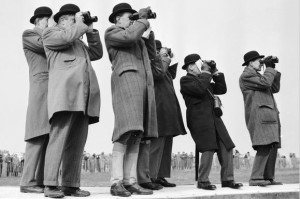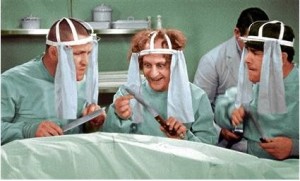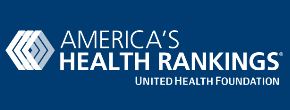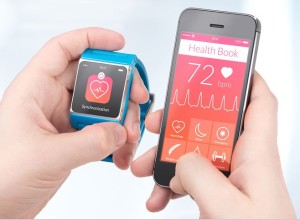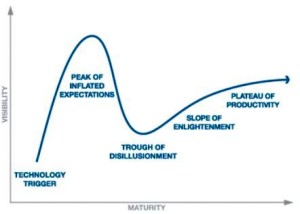- 3 people to watch in biotech and drug pricing in 2016 (statnews.com)
Big valuations, big investments, and big price tags drove lots of the news in health care in 2015 — and you can bet they’ll do the same in the new year. For signs of where things are headed, keep an eye on these three influencers:
- Jeffrey Marrazzo, chief executive of Spark Therapeutics - Can gene therapy work — and can the system afford to pay for it?...The idea that a one-time treatment could replace a broken gene has generated plenty of scientific and commercial interest.
- Deborah DiSanzo, general manager of Watson Health - IBM’s big bet on health care analytics...use high-powered computing to sift through massive amounts of data to find useful and cost-saving nuggets for medical researchers, doctors, and insurers.
- Vivek Ramaswamy, chief executive of Axovant Sciences - has recruited some top Alzheimer’s researchers to join his...company...they initiated a late-stage clinical trial testing the GSK reject in combination with another Alzheimer’s drug.
- Half Of U.S. Doctors ‘Burned Out’ As Obamacare Begins Third Year (forbes.com)
The number of U.S. physicians who say they are suffering "burnout" has jumped to more than half of doctors as the practice of medicine becomes more complicated and millions more Americans gain health coverage under the Affordable Care Act...An analysis from researchers at the Mayo Clinic and the American Medical Association say doctors’ work-life balance is worsening, with the percentage of physicians who say they are suffering burnout rising to 54% in 2014 from 45% in 2011..."disturbing trend"..."Burnout and satisfaction with work-life balance among U.S. physicians are getting worse,"..."American medicine appears to be at a tipping point with more than half of U.S. physicians experiencing professional burnout...has effects on quality of care, patient satisfaction, turnover, and patient safety, these findings have important implications for society at large."
- Nevada ranks 38th in nation for overall health (rgj.com)
According to an annual report from the United Health Foundation, Nevada is ranked 38th in the U.S. when it comes to health...Nevada’s rank in 2014 was 39, so the state has improved over the past year. Here are some snapshots of how Nevada compares to national numbers for health-related topics:
- In Nevada, 17 percent of people smoke compared to the 18 percent national average.
- Drug deaths are significantly higher in Nevada, with 22.4 overdose deaths per 100,000 people compared to a 13.5 death average nationally.
- Nevada is average when it comes to the inactivity of adults. 22.5 percent of adults in Nevada are physically inactive compared with 22.6 nationally.
- Infant mortality is lower in Nevada, with 5.1 deaths per 1,000 live births compared to the 6 national average.
- In Nevada, 27.7 percent of adults are obese compared to the national average of 29.6. For diabetes, 9.6 percent of Nevadan adults have diabetes compared to 10 percent nationwide.
- For children’s vaccinations, 67.7 percent of children in Nevada are immunized compared to 71.6 nationally.
The top five healthiest states in the nation, according to the report, include Hawaii, Vermont, Massachusetts, Minnesota and New Hampshire
- Drug Approvals and Priority Reviews Highlight Cancer Treatment News (specialtypharmacytimes.com)
- Atezolizumab/Nab-Paclitaxel Highly Effective in Breast Cancer
- Pembrolizumab Effective in ER-Positive Breast Cancer
- Neratinib 3-Year ExteNET Data Similar to Primary Analysis
- Buparlisib Modestly Effective in Breast Cancer
- Avelumab Effective in PD-L1-Positive Breast Cancer
- Adding Denosumab Improves DFS in Breast Cancer
- FDA Approves Alectinib for ALK-Positive NSCLC
- FDA Approves Cooling Cap to Prevent Hair Loss
- Priority Review Granted to Palbociclib Plus Fulvestrant
- FDA Approves Bendamustine Hydrochloride for CLL, NHL
- Priority Review to Crizotinib for ROS1 NSCLC
- FDA Approves Uridine Triacetate for Chemo Overdose
- FDA still seems reluctant to regulate mobile health apps (medcitynews.com)
Remember when the Food and Drug Administration was going to regulate mobile health apps? The year was 2013...There was even a bill from the congressman representing Silicon Valley that aimed to tame the “Wild West” of mobile and wireless health. The House Energy and Commerce Committee even held three...days of hearings...Rep. Mike Burgess asking then-national health IT coordinator Dr. Farzad Mostashari to magically create interoperability...Now, it sounds like the FDA might almost be ready to throw its hands up and walk away...the agency circulated a draft guidance that really didn’t say much...The 2013 final version clarified policy a bit, stating that the FDA generally would focus only on mobile apps that serve as medical devices, and mostly stay away from regulating consumer technology...Earlier this year, an FDA specialist in digital health told Bloomberg that the agency would be “almost hands-off” when it comes to consumer wellness and fitness gadgets...
- Valeant’s big pharmacy deal with Walgreens includes quirky drug-buyback plan (fiercepharma.com)Valeant Taking Titles to Drugs on Walgreens’ Shelves (sub req) (wsj.com)
Valeant Pharmaceuticals' much-ballyhooed agreement with Walgreens includes an unusual inventory provision that helps explain why the pharmacy chain might have been eager to strike a deal...Valeant is buying back its drugs from Walgreens and selling them on consignment to the pharmacy, a provision that triggers an upfront financial hit. Walgreens won't physically return the drugs, just the title to them...It's just one out-of-the-ordinary feature of an out-of-the-ordinary pharmacy deal. Valeant announced last week that it had teamed up with Walgreens to distribute its drugs, discounting key skin and eye brands by 10% and another slate of meds by an average of 50%. Walgreens is taking the Valeant drugs on consignment and collects fees for filling prescriptions…The Walgreens partnership replaces Valeant's relationship with Philidor, a specialty pharmacy that was closely tied to the drugmaker until questions arose about its operations...The drugmaker is expecting a sales hit from the pharmacy shift, partly because of the mechanics of the Walgreens deal and partly because of lower demand for its drugs in the wake of the Philidor allegations.
- New FDA policy gives its staff wide latitude on social media. Could pharma freedom follow? (fiercepharmamarketing.com)
Tweet at will, FDA employees. One of the most liberal social media policies in the federal government now belongs to the FDA. Just last month, the FDA finally set out its own departmental policy that encourages its scientists and other employees to use "social media technologies to enhance communication, collaboration, and information exchange in support of FDA's mission to protect and promote public health."...While many would argue that the guidelines for pharma and other medical regulated products on social media outlined so far by the FDA have had a chilling effect on the industry's social media use, especially Twitter, its own FDA employee guidelines should have quite the opposite effect...
- Dear Santa: Can you bring me a happier, healthier healthcare industry? Dear Santa, (medcitynews.com)
Dear Santa,
I’m writing to you with my Christmas wish list. I realize that I am a little over the typical age limit for this activity, but I am pretty short so maybe I can still pass for a kid? I also know that, as a venture capitalist, I may automatically default to the "naughty list." But I am an eternal optimist and I’m hoping that the social value inherent in investing in healthcare instead of video games and drones can help me put a few points on the Santa board...Here’s to hoping that my wishes will be fulfilled, for what it’s worth, I will be listening for Rudolph et al on Christmas Eve, cookies at the ready. I make really good cookies. Here’s my list, in no particular order:
- Great companies with rational valuations
- A better IPO market for digital health companies
- A parade of experienced, driven, humble entrepreneurs who can balance their tech and healthcare knowledge for good
- A world where venture capitalists and entrepreneurs recognize that diversity is a plus–
- A medical system that values the active role of the patient aka consumer
- A better work environment for physicians, nurses and others who care for people
- Recognition and reward for the unpaid and overwhelmed caregivers of our nation
- An end to avoidable medical errors
- A pony
Anyway, whatever your holiday of choice—Hanukkah, Christmas, Kwanzaa, New Years Eve, Festivus or other—I hope yours is a great one and that you find love, relaxation and moments of joy before the new year revs up again...Happy Holidays everyone.
- Which Biotechnologies Were Hyped (And Which Went Out Of Favor) In 2015 (forbes.com)
"Don’t Believe the Hype."...It’s good advice for people operating in the R&D side of pharmaceuticals. Many exciting things are happening today in the science, so it’s easy to get carried away. But this year’s market correction–driven in part by systemic concerns about drug pricing, a few clinical trial blowups and shenanigans—should serve as a vivid reminder. No matter how good the fundamentals are, biotech still hasn’t figured out how to carefully calibrate perceptions to keep the steam engine steadily chugging along, without letting things get too hot or too cold...Hype has always been part of biotech because investments must be made on glimmers of promise, otherwise known as incomplete data. Without hype and hope, the industry couldn’t exist...There’s no good way to quantify perceptions, and things change fast in biotech, but I do talk every day to lots of different people with their fingers on the pulse of different things. So I thought it would be fun to try again this year with plotting various biotech platforms and concepts along the Gartner hype curve.
Peak of inflated expectations
- CRISPR/Cas9 genome editing.
- Microbiome everything.
- Genomic wellness.
- Conquering antibiotic resistance.
Trough of Disillusionment
- Digital health.
- Stem cell therapies.
Climbing up the Slope of Enlightenment
- Immuno-oncology.
- Viral Vector Gene Therapy.
- Long-read sequencing.
- The top 10 pharma companies in social media (fiercepharmamarketing.com)
Chatting with the public is not in pharma's comfort zone. Drugmakers are adept at the one-way communication known as direct-to-consumer advertising, and some of them deal well with the media. Some even know how to work with patient groups. Back-and-forth with doctors? Pharma's daily bread...But put your average, everyday drug company in the middle of a public conversation, and it freezes up. Worried it will say the wrong thing, sensitive to criticism, mindful of unintended consequences, drugmakers usually prefer to stand by the punch bowl and check their iPhones for messages...You could say pharma has social anxiety...Drugmakers' usual excuse for remaining social-media wallflowers is regulation, or lack of it. The FDA's guidance on the subject is piecemeal and tardy; the agency has slapped companies for overstepping bounds they didn't know existed.

